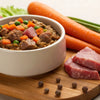Is Dog Food Bad for Puppies? Understanding Puppy Nutrition
- Houndsy
Table of Contents
- Introduction
- The Nutritional Needs of Puppies
- Why Puppy Food Is Crucial
- Making Informed Choices about Dog Food
- Reflecting on Feeding Practices
- Conclusion
Introduction
If you’ve recently welcomed a puppy into your home, you’re likely filled with joy, excitement, and perhaps a bit of trepidation. Alongside the cuddles and playtime come numerous questions about caring for your new furry friend. One of the most crucial topics that new pet owners grapple with is nutrition. A common query is whether the food we choose is suitable for our growing pups. So, is dog food bad for puppies? While it may seem like a straightforward question, the answer is more nuanced than you might think.
Puppies require a specialized diet that significantly differs from adult dog food. Their rapid growth and development necessitate specific nutrients in a balanced ratio—a detail that many pet owners may overlook. In this blog post, we, at Houndsy, will explore the intricacies of puppy nutrition, including the importance of feeding specialized puppy food, what constitutes healthy options, and how to transition them over time. By the end of this post, you will gain a comprehensive understanding of what you should be feeding your puppy for optimal health and development.
Our aim is to equip you with the knowledge to make informed decisions for your puppy, helping them to thrive during this crucial stage of life. As responsible pet owners, we should prioritize their nutritional needs. So, let’s get started!
The Nutritional Needs of Puppies
Unique Growth Stages
Puppies undergo several significant developmental phases in their first year of life. Although they may look like little adults, puppies are biologically different and have unique nutritional requirements. For example,:
-
Higher Caloric Needs: Puppies need more calories than adult dogs, approximately twice as many calories per pound of body weight. This energy supports their rapid growth, muscle development, and day-to-day activities.
-
Increased Protein Levels: According to the American Association of Feed Control Officials (AAFCO), puppies require a higher percentage of calories from protein than adult dogs. This macronutrient fosters optimal muscle development and supports overall well-being.
-
Essential Fats: Fat not only provides energy (with twice the calories as proteins or carbohydrates) but also aids in the absorption of vital fat-soluble vitamins. Puppy food is typically richer in fats to sustain their energy requirements.
-
Mineral Balance: Important minerals like calcium and phosphorus are crucial for bone growth and development. These minerals must be present in the right ratios to prevent health issues, especially in large-breed puppies.
-
Vitamins: Comprehensive nutrition includes a range of vitamins that support various bodily functions as well as long-term health.
Dog Food vs. Puppy Food
A prevalent misconception is that any dog food is sufficient for puppies, as long as it contains protein and essential nutrients. This is where the distinction between puppy food and adult dog food comes into play.
-
Nutritional Composition: Adult dog food is formulated for maintenance, not growth. It lacks the necessary balance of protein, calories, and essential nutrients, thus making it inadequate for a puppy’s rapid growth.
-
Potential Risks: Feeding adult food to puppies can lead to malnutrition, stunted growth, or even obesity. Such imbalances can have long-lasting effects on their bone structure and overall health.
Transitioning to Adult Food
The transition from puppy food to adult food typically occurs between 12 to 18 months, depending on the breed. Small breeds tend to mature faster, while larger breeds may require more time. Nevertheless, cutting corners by switching too early can lead to detrimental growth patterns.
Veterinary Recommendation: Always consult your veterinarian regarding when to make this transition. They can provide insights tailored specifically to your puppy's size, breed, and health requirements.
Why Puppy Food Is Crucial
Supporting Healthy Growth
Puppy food is specifically formulated to ensure they receive the appropriate nutrients for:
-
Bone Development: The right amounts of calcium and phosphorus promote healthy skeletal growth, critical during the puppy's formative years.
-
Brain Development: Nutrients like DHA (Docosahexaenoic acid) are essential for cognitive function and are prevalent in high-quality puppy food.
Reducing Risks of Health Issues
Opting for puppy-specific food significantly reduces the likelihood of:
-
Nutritional Deficiencies: Improper ratios of nutrients can lead to conditions like rickets or joint problems, particularly in large-breed puppies.
-
Weight Management: Because puppy food is designed to provide the proper calories and nutrients, it helps maintain a healthy weight—a vital factor in averting obesity-related issues later in life.
-
Digestive Problems: Adult dog food is often not easily digestible for puppies, which can result in gastrointestinal distress.
Making Informed Choices about Dog Food
Selecting Quality Puppy Food
As conscientious pet owners, we should carefully choose puppy food to ensure it meets high-quality standards. Here’s what to look for:
-
AAFCO Approval: Look for food labeled as meeting AAFCO nutrient profiles for growth and reproduction. This ensures it meets the necessary standards for puppy nutrition.
-
Ingredient Quality: Ingredients should be recognizable and preferably sourced from reputable suppliers. Whole meats, vegetables, and grains are preferable to by-products or fillers.
-
Brand Reputation: Choose brands committed to using high-quality ingredients and transparent manufacturing processes.
Types of Puppy Food
There are various forms of puppy food available—some popular options include:
-
Dry Kibble: Economical and easy to store, providing balanced nutrition, while helping to maintain dental health.
-
Wet Food: Usually more palatable, it can encourage puppies who might be picky eaters. Be aware of portion sizes, as they can be higher in calories.
-
Fresh and Raw Diets: Although they can be beneficial, these require careful preparation and should only be implemented after discussing with your veterinarian.
Reflecting on Feeding Practices
As we dive deeper into the feeding routines for our puppies, it’s essential for us to reflect on our current practices.
-
Are you feeding the right type of food? Assess whether your puppy is receiving specific food formulated for their growth stage.
-
Feeding Schedule: Puppies often require more frequent meals. How often are you feeding your puppy, and is there room for improvement?
-
Monitoring Growth: Regularly check your puppy's weight and body condition, adjusting their food intake based on their growth trajectory. Follow up with your vet to ensure there are no significant issues.
Conclusion
To wrap up our discussion, we can confidently affirm that feeding puppy food is essential—not just a matter of convenience. Puppies deserve the best start in life, and providing the correct nutrition fosters lasting health and happiness.
Choosing a high-quality puppy food that aligns with your puppy’s unique nutritional needs creates a solid foundation for their comedic antics, snuggles, and shared moments. If you want to simplify your puppy feeding experience, consider the Houndsy Kibble Dispenser, designed to deliver perfectly portioned meals while eliminating the mess. Check it out here!
FAQs
Can I feed my puppy adult dog food?
No, puppies have different nutritional requirements than adult dogs. Adult food may not provide essential nutrients needed for growth and development.
Is it okay for adult dogs to eat puppy food?
While it’s not harmful in small amounts, routinely feeding adult dogs puppy food can lead to obesity and health issues due to the higher caloric content.
How can I transition my puppy to adult food?
Gradually mix adult food with puppy food over a week, starting with 75% puppy food and 25% adult food, and adjusting the ratios until you’re feeding solely adult food.
How long should I feed puppy food?
Feeding puppy food should continue until they reach 12 to 18 months, depending on their breed and size. Consult your veterinarian for guidance.
In the end, let’s prioritize our puppy's health and happiness—one meal at a time!












